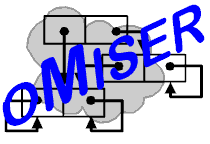

|
{Ed. Note: This is a boilerplate page. As part of the incorporation of this topic in a folio, this becomes the front page and the notes-to-self and other materials will be handled differently. The previous content of this page is now within the Folio as the Early Conception.}
Today (March, 2002), I think of Ob as a mathematical structure, Ob:
‹Obs, Inds, Ops›.In this structure, Obs is the domain of Ob, Inds are the set of distinguished individuals (also in Obs), and Ops are the fundamental operations/functions/predicates of the structure. The formalization of the structure comes in through reliance on an informal or formal logical system.
I also realize today (March 9, 2002) that I should begin speaking of Ob in the singular. This comes from the following realization:
In a real sense, every Ob (in the sense of a member of Obs) is a manifestation of the entire structure, Ob.
That is, individuals and the whole are inseparable, and speaking otherwise (as I am here) is a phenomenon of language and not an assertion of any reality.
It is an useful device to then use Ob as a collective singular, as well as for speaking of individuals. When we speak of Obs, as in distinguishing multiple members of the set of Structs, we are engaging in ordinary language. But to speak of Ob is to encourage the recognition that these apparent "parts" have no independent existence apart from the structure of Ob.
It is particularly useful in looking at the interfaces of implementations for an Ob (here, a singular manifestation of the/an/one abstract Ob).
 |
|
created 2002-03-09-14:37 -0800 (pst) by
orcmid |